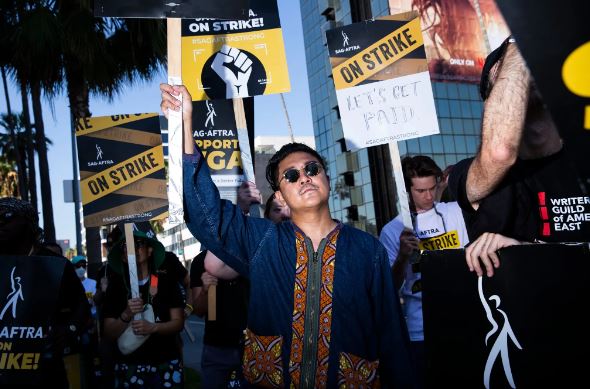The SAG-AFTRA actors’ union announced a strike against video game companies that use actors’ voices and images in games, set to begin at 12:01 a.m. Pacific time on Friday. The decision follows more than a year and a half of negotiations and highlights ongoing concerns within the industry regarding fair wages and the use of artificial intelligence (AI).
The strike affects major players in the gaming industry, including Activision Blizzard, WB Games, Electronic Arts, and seven other companies. These companies are part of an interactive-media agreement that expired in November 2022, which the union chose not to renew, effectively ending an extension last summer. It’s important to note that games already in production as of September 2023, including live service games like Fortnite that receive continuous updates, are exempt from this strike order.
SAG-AFTRA’s primary demands echo those made in their previous strike against television and movie studios. The union is seeking higher wages and job protections, particularly concerning the use of AI in the industry. Fran Drescher, SAG-AFTRA’s president, emphasized the union’s stance, stating, “We’re not going to consent to a contract that allows companies to abuse A.I. to the detriment of our members. Enough is enough.” Duncan Crabtree-Ireland, the union’s executive director and chief negotiator, added that it is surprising the video game studios have not learned from recent events and stressed the union’s resolve in demanding fair treatment, especially in the context of AI.
The union is also pushing for improved safety measures on sets, such as having a medic available, to ensure a safer working environment for actors involved in video game production.
In response, the consortium of video game companies expressed disappointment over the union’s decision to strike. They claimed that negotiations were close to reaching a resolution and that their latest offer addressed SAG-AFTRA’s concerns, including providing meaningful AI protections.
This strike marks the second time in recent years that SAG-AFTRA has taken such action against video game companies. The last strike, in 2016, lasted nearly a year but had minimal impact on the industry and established game franchises. However, the union believes that with the growing influence of AI and the need for fair compensation, their current demands are crucial for the industry’s future.
However, the majority of video game voice work provides opportunities for lesser-known actors, offering them a platform to break into the industry. This makes the union’s demands for fair wages and protections particularly significant, as it seeks to safeguard the interests of all its members, not just the more visible ones.
The combined strikes by SAG-AFTRA and the Writers Guild of America last year brought significant disruption to Hollywood, halting production lines for television and movies. While video games typically have longer development cycles than TV shows or films, making the immediate impact of a strike less visible, the potential long-term consequences could still be substantial. The union’s actions aim to address systemic issues within the industry, setting a precedent for future negotiations and the treatment of workers in the ever-evolving landscape of entertainment and technology.
SAG-AFTRA’s strike against video game companies underscores a broader movement within the entertainment industry to secure fair wages, better working conditions, and protections against the misuse of AI. The outcome of these negotiations could shape the future of how actors and other talent are treated in the rapidly changing digital landscape.

